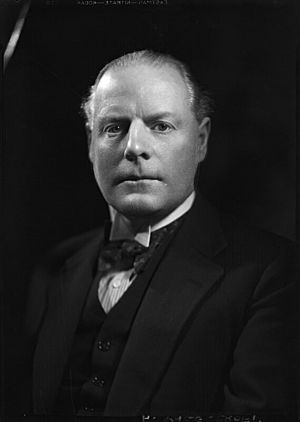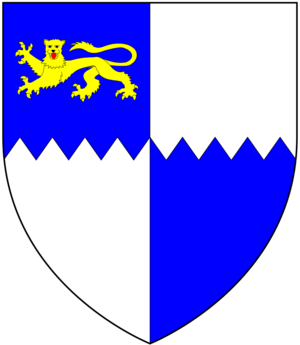Henry Page Croft, 1st Baron Croft facts for kids
Quick facts for kids
The Lord Croft
|
|
|---|---|
 |
|
| Under-Secretary of State for War | |
| In office 1940–1945 |
|
| Monarch | George VI |
| Prime Minister | Winston Churchill |
| Preceded by | The Lord Cobham |
| Succeeded by | The Lord Nathan |
| Member of Parliament for Bournemouth Christchurch (1910–1918) |
|
| In office 15 January 1910 – 28 May 1940 |
|
| Preceded by | Arthur Acland Allen |
| Succeeded by | Leonard Lyle |
| Personal details | |
| Born | 22 June 1881 Fanhams Hall, Ware, Hertfordshire |
| Died | 7 December 1947 (age 66) London, England |
| Nationality | British |
| Political party | Conservative, National Party (1917) |
| Alma mater | Eton College, Shrewsbury School, Trinity Hall, Cambridge |
| Profession | Politician, soldier |
| Awards |
|
| Military service | |
| Allegiance | |
| Branch/service | |
| Years of service | 1900–1924 |
| Rank | Brigadier |
| Unit | Hertfordshire Regiment |
| Commands | 68th Brigade |
| Battles/wars |
|
Henry Page Croft, 1st Baron Croft (born June 22, 1881 – died December 7, 1947) was an important British soldier and Conservative Party politician. He was known for his strong beliefs and his service to his country.
Contents
Early Life and Family Background
Henry Page Croft was born at Fanhams Hall in Ware, Hertfordshire, England. His father, Richard Benyon Croft, was a naval officer. He also helped the Richard Hale School a lot.
Henry's father held important local positions. He was the High Sheriff of Hertfordshire in 1892. He was also a Deputy Lieutenant and a Justice of the Peace (J.P.) for Hertfordshire.
Henry's mother, Anne Elizabeth, inherited a large fortune. Her father, Henry Page, was a very successful businessman. He owned a thriving grain trade and a maltster business in Ware. He left his wealth, including the large country house Fanhams Hall, to Anne and her husband.
Education and Early Career
Henry Croft went to some famous schools. He first studied at Eton College. After his housemaster died, he moved to Shrewsbury School. Finally, he attended Trinity Hall, Cambridge University.
At Cambridge, he was part of the Volunteers. He was also an oarsman, meaning he rowed boats. After finishing university, Croft joined his family's business.
Becoming a Member of Parliament
Henry Croft became very active in politics. He joined a group of young politicians who supported "Protectionism." This idea meant protecting British industries by taxing goods from other countries.
In January 1910, he was elected as a Member of Parliament (MP) for Christchurch. He was known for being against Germany and for supporting Protectionism. He worked hard for tariff reform before the Great War.
Croft also started a group called the "Reveille." This group wanted to promote the British Empire and social improvements.
Parliamentary Actions and World War I
In the House of Commons, Croft strongly supported taxing food. He also wanted "Imperial Preference," which meant favoring trade within the British Empire. He backed Ulster against Irish home rule, which was about Ireland governing itself.
When the First World War began in 1914, Croft went to France. He commanded a brigade, which is a large group of soldiers. He was the first territorial soldier to lead a brigade in battle. However, he was called back to the Commons in 1916.
Forming the National Party
In 1917, Croft helped create the National Party. He believed the old political parties were failing. The new party wanted a complete victory in the war. They also aimed to remove German influence in Britain.
The National Party also wanted to stop the practice of selling honors. They pushed for fair wages and profits. They believed in strengthening the British Empire by working together. They also wanted social policies that would create a "patriotic race."
Views After World War I
After the war, Croft believed Britain was stronger than ever. He thought Britain had a powerful navy, army, and air force. However, he was worried that Britain was relying too much on the League of Nations. He saw the League as a weak group of nations.
Croft was a strong nationalist. He believed Britain should focus on its own strength. He was against giving reparations (payments) to Germany. He also opposed the Government of India Act 1935. This act gave more self-government to India.
He worked with Winston Churchill to push for Britain to build up its military again. Croft had read Mein Kampf and believed Nazi Germany would start a war. However, he supported the Munich Agreement. He thought Britain could not stop Germany from taking the Sudetenland because Britain was not ready for war.
Under-Secretary of State for War
In 1940, Henry Croft was given a special title, becoming a Lord. Winston Churchill then appointed him as Under-Secretary of State for War. He held this important job until July 1945.
During The Blitz, when German planes bombed London, Croft saw how brave Londoners were. He wrote about how everyone, from the Royal Family to ordinary people, showed courage. They faced the bombs and rockets with defiance.
Croft also saw the need to boost morale in the Army. He believed soldiers needed more education and entertainment. He suggested travelling cinemas, technical classes, and correspondence courses. He also wanted stories about the Empire and regimental traditions to be shared. By 1943–44, many courses and lectures were being provided to servicemen.
In 1942, Croft made a speech about the Home Guard. He suggested that in close-quarters fighting, like in cities, hand grenades and even pikes could be useful. This idea was made fun of by some in the press. They joked that Croft was "pike-minded."
Later, during the 1945 election, Croft made a comment about a political opponent. Churchill advised him to be careful with his words. He warned against saying things that could be misunderstood.
Last Years and Legacy
Henry Page Croft passed away in 1947 in London.
After he died, The Times newspaper wrote about him. They said he was a dedicated and patriotic person. He strongly believed in the British Empire. He put his service to the Empire above party loyalty. His strong personality and enthusiasm made him influential in politics.
He always encouraged British people to settle in the Dominions (countries like Canada and Australia). He also wanted to strengthen the bonds of the Empire. Croft believed that citizens should serve the state in some way. He was well-liked at the War Office. He was also a good speaker who could always get his message across. He was seen as a truly sincere patriot.
Writings
- H. P. Croft, 'A citizen army', in Lord Malmesbury (ed.), The New Order: Studies in Unionist Policy (1908).
- H. P. Croft, The Path of Empire (1912).
- H. P. Croft, Twenty-Two Months Under Fire (1916).
- H. P. Croft, The Crisis: How to Restore Prosperity (1931).
- H. P. Croft, The Salvation of India (1933).
- Sir Henry Page Croft, 1st Baron Croft, My Life of Strife (1948).


